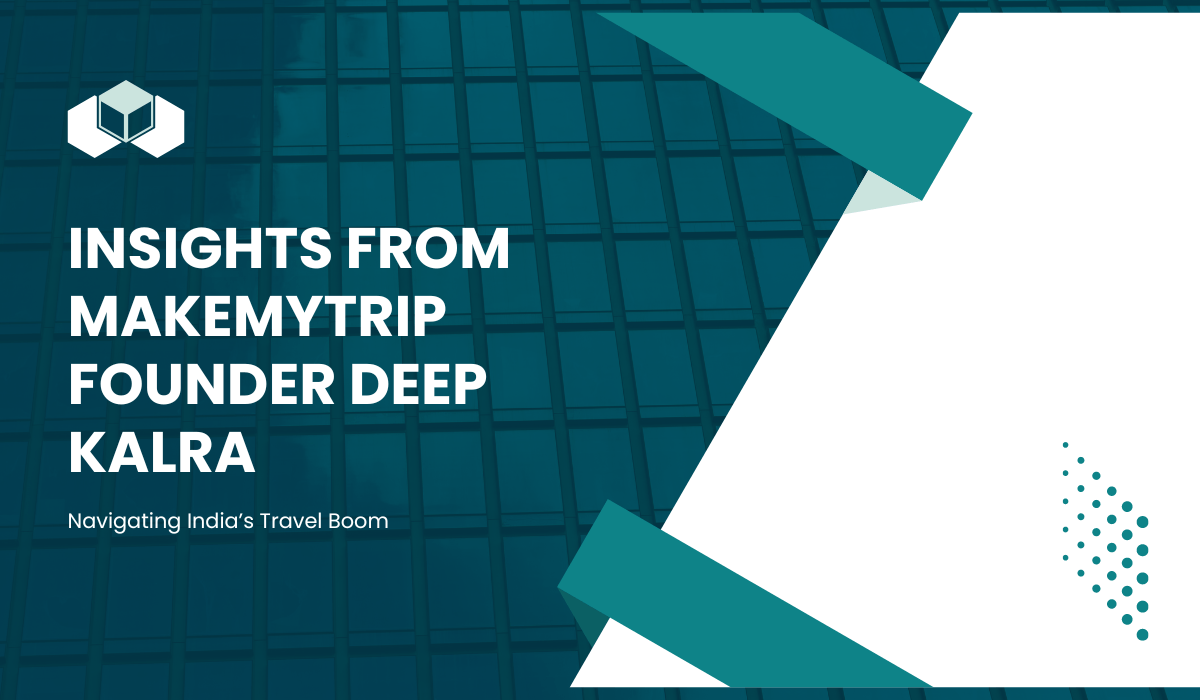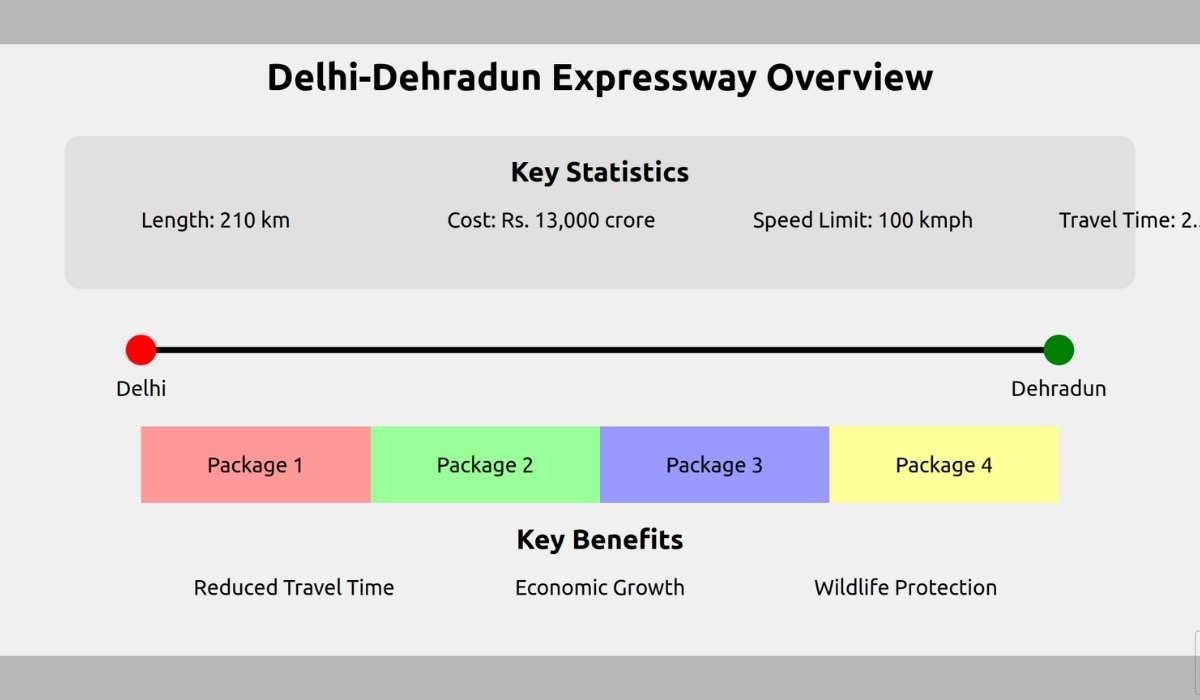Deep Kalra didn’t just ride the wave of India’s travel tech revolution – as founder of MakeMyTrip, he helped create it. In this freewheeling interview, the startup veteran shares his perspectives on India’s rapidly evolving travel market, the consumer mindset shift fueling the boom, and lessons for founders looking to build the next big thing.
The Golden Age of Indian Travel
According to Kalra, India is entering a “golden period” for the travel industry driven by rising incomes, exposure to global trends, and an aspirational mindset among young consumers. “The next two decades belong to India,” he declares, contrasting the unbridled enthusiasm with the 2000s when people still hadn’t warmed to booking travel online.
Better payment infrastructure, 5G connectivity, and computing power in every palm are “building blocks” accelerating adoption. But the bigger catalyst, Kalra notes, is soaring disposable incomes and willingness to spend. “Our parents’ generation saved 54% of income. We save only 17%,” he observes, “A difference of 37 percentage points – that’s huge!”
This whetting of the travel appetite is most visible among millennials and Gen Z. Kalra cites the example of a young MakeMyTrip employee taking a jaw-dropping 52 vacations a year! As the middle class swells, travel is becoming a way of life, not an annual indulgence. “People are saying, you have to spend. They’ve made up their mind they’re not going to buy a house – it’s the renting economy. They will spend all their money on experiences.”
The Rise of the Aspirational Indian Traveler
Kalra attributes this dramatic shift in mindset to rising aspirations fueled by greater exposure to global trends and lifestyles. “Today, if you see youngsters in any part of the country, they dress no differently from youngsters in Mumbai or overseas,” he observes.
Unlock Your Dream Home Today!
Get personalized real estate insights delivered straight to your inbox.
This amplified desire to explore the world and experience new cultures is facilitated by increasing affordability of travel. “Every time I travel, I’m fascinated by who is traveling, what they want to do when visiting different places,” Kalra shares. “You see people from all walks of life, from metro cities to small towns, crisscrossing India and the world.”
Empowering this mass travel movement is the convenience and reliability enabled by online platforms like MakeMyTrip. “Indians are definitely getting aware of their rights as consumers. They want the best experience, so whether it’s food delivery or movie tickets, they go where that need is best served,” Kalra explains.
The democratization of technology and growth of the digital economy have been great equalizers. “Today’s youngsters are more comfortable operating online than offline. It’s second nature to have everything at their fingertips through apps,” according to the seasoned entrepreneur.
Sustainability Concerns Amid the Travel Frenzy
However, the travel boom comes with a warning. Kalra is deeply concerned about “overtourism” crippling iconic destinations like Manali, Nainital, and Goa under the weight of uncontrolled visitor traffic. “We’re ruining these places one by one,” he laments, advocating stronger policies and enforcement of tourism carrying capacities.
“I’ve seen Andamans, I’ve seen Ladakh. In the 4-5 month season, you don’t want to live there due to sanitation issues from overcrowding,” Kalra rues. He recounts how Manali, once a pristine paradise, now has worse traffic jams than Delhi during peak season with throngs of vendors disrupting the local ecosystem.
His passion for sustainable travel solutions stems from running a travel platform with over 60 million customers. “I see who is traveling, what they want to do when visiting different places. This is the emergence of a country breaking into the worldwide scene with $2000 per capita income, not $6000.”
According to Kalra, the solution lies in striking a balance between growth and sustainability through measures like:
- Clearly defined tourism carrying capacities for destinations
- Stricter enforcement of zoning laws and regulations
- Creating more tourist circuits beyond conventional hotspots
- Incentives for sustainable tourism practices by businesses
“If we don’t preserve these destinations, wherever will people travel?” Kalra ponders. “We cannot let our natural and historical treasures be loved to death due to short-sightedness.”
Keys to Startup Success in Travel: Solve a Real Problem, Innovate Globally
For aspiring entrepreneurs looking to ride this travel market wave, Kalra emphasizes solving a genuine customer pain point and shooting for global innovation, not just domestic dominance. “Can I do it better than anyone in the world? Not just in India today – gone are the days when that was enough.”
He cites Booking.com and Airbnb as formidable global competitors MakeMyTrip must match in quality. “If you’re going into a big space like quick commerce, you’ve got to take on not just Indian players but the big global firms who will pour in money. What are your capabilities?”
Kalra advises founders to be brutally honest about their skills and get candid feedback from critics, not just well-wishers. Solving a real problem is paramount, whether through creating new demand like Apple or tackling an overlooked niche that brings sustainable fulfillment.
“Don’t come to me saying you want to be an entrepreneur and asking for an idea. It has to be yours – your passion that keeps you up at night taking notes,” he cautions. “After that fire, you need to be sincere in pursuit of solving a widespread issue or tapping into an unmet need.”
The travel veteran highlights two potential pathways for disruption:
1) Identifying a mass consumer pain point and creating an exceptional solution
2) Anticipating emerging lifestyles/needs and pioneering an innovative product
He exemplifies the latter approach with MakeMyTrip’s recent ‘FairLock’ feature where customers can lock in airfares by paying a small premium irrespective of future price movements. “It removes the fear that prices may spike later, addressing a common customer anxiety.”
Such consumer-centric innovations born of deep empathy are key to standing out in a crowded market. “Customers today are spoiled for choice across categories. To earn their loyalty, you must keep reinventing the experience and building trust as a brand they can rely on,” says Kalra.
On Specialization vs Being a ‘Super App’
The serial entrepreneur firmly believes that deep specialization, not horizontal expansion into a super app, is the path to long-term success in the digital era.
“People go to the best brand for each service rather than settling for an Okay integration of everything,” Kalra opines. “There’s no friction in shifting between best-of-breed apps anymore. So why wouldn’t you specialize in doing one thing exceptionally well?”
He contrasts this with telco-led super apps in markets like China where players could intersect multiple services by controlling data pipelines and ecosystems. “In a democratic Internet, it’s all about relentlessly improving your core expertise rather than trying to be decent at multiple things.”
MakeMyTrip’s singular focus is to be the consummate travel companion for Indians – “The one place people will trust for anything related to travel experiences.” To that end, the company continues expanding into aligned areas like accommodations, holiday packages, and bus ticketing.
“We want to be travel explorers and innovate amazing new ways for Indians to experience travel. That’s our superpower, not being another digital mall,” Kalra sums up.
So for founders wondering whether to build a super app or laser-specialize, Kalra’s advice is clear: “Find your true differentiation, stay laser-focused on being a category leader, and keep re-earning customer trust. That’s what breeds market winners.”
Team Dynamics: Nurture Diverse Talents
Another key insight is recognizing different motivations and temperaments on the founding team. “There are people phenomenal at starting up who will catch any ball and run with it through the hustle phase. But they may not have skills to scale up efficiently,” Kalra notes. As companies progress through stages, different leadership profiles become more valued.
The MakeMyTrip chief gives the example of co-founder Rajesh Magow who he credits as being a better CEO. “I could even dream of going non-executive because Rajesh was brilliant at operations and executing growth plans while I was more product/design obsessed and excitable.”
The ability to attract and nurture a diverse array of talents is therefore critical. “Your job is to get the best out of people, create an environment where they can genuinely disagree with you respectfully,” he says. “The person who is a ‘pain in the ass’ disagreeing and backing it up with logic is your best friend!”
Kalra strongly believes that beyond a baseline IQ, emotional quotient becomes the biggest determinant of team success. “As you go higher, EQ becomes more critical than IQ. You have to motivate people, make them feel valued and heard even if their opinions differ.”
From the vantage point of decades of scaling MakeMyTrip, Kalra advocates playing to individual strengths and creating role-clarity early on. “I naively started off alone thinking I could do it all, before smartening up and realizing the value of diverse co-founders with complementing skills.”
While the stereotypical startup culture celebrates individual winners, Kalra says the real work is in collaborating as a well-oiled unit. “No individual can have all capabilities needed at different stages of growth. You cannot afford hubris or falling into the ‘hit by the bus’ trap if a key leader exits.”
The entrepreneurial mindset, he advises, should be of nurturing constant evolution and renewal. “Even if you start as a solo founder, be aware of your blind spots. Hire people who agonizingly point them out. Keep bringing in fresh talent and groom them for bigger roles.”
Unlocking Opportunities in the New India
India’s global cadre of talent and capital inflows make this an incredibly opportune era for travel startups. But founders must solve for sustainability, build for the world, and assemble teams with complementary strengths. Those key ingredients could go a long way in creating the next MakeMyTrip.
To anyone looking to disrupt this space, Kalra’s final words are simple but powerful: “Why would the best minds not want to return to India when the market and opportunity is here? This is going to be unparalleled and unmatched.”
According to Kalra, the new India offers unmatched tailwinds for enterprising founders:
1) Growing Consumer Prosperity & Optimism
“I see a lot of youngsters going overseas to study, which is great. But people would say their parents won’t let them come back to India. I disagree – everyone will return because the biggest market and opportunity lies here.”
2) Demographic Might
With one of the world’s youngest populations and an expanding middle class, domestic demand is poised for a multi-decade growth run. “We’re well-placed with the right demographics to capitalize on this era of rising incomes and consumerism.”
3) Grassroots Innovation Potential
Kalra believes the “next big thing” is unlikely to come from cloning Western ideas. “India’s diversity means we keep unearthing unique problems to solve. This is where disruption and innovation will be bred.”
4) Infrastructure Enablers
Be it digital payments, connectivity, or data affordability, India has laid the vital plumbing for tech disruption. “We have the building blocks in place to do things faster than even China did,” claims the seasoned entrepreneur.
5) Supportive Startup Ecosystem
From accelerators and Angel funds to unicorn success stories, India’s startup ecosystem is gaining critical mass and maturity. “Barriers like funding scarcity and talent flight are rapidly getting deconstructed. It inspires confidence.”
With all these winds in its sail, India’s time is finally arriving on the world stage. As Kalra summarizes, “The beauty of the internet is that we can break into the global scene much faster despite having only $2000 per capita income, not $6000. We’re just going to explode!”
The veteran founder may have traveled the world, but he remains decidedly optimistic that India’s entrepreneurial best is yet to come. The next MakeMyTrip could well come from an ambitious young mind looking to redefine how Indians travel, eat, shop or live.
The opportunity has never been bigger. And if Deep Kalra’s insights are any indicator, neither have the odds of entrepreneurial success.
Additional Insights
In addition to the wealth of insights shared by Deep Kalra on the Indian travel market, entrepreneurship, and leadership, here are some additional perspectives that could add further value for readers:
On Building a Sustainable Organization
“One of the biggest mistakes I made early on was thinking I could do everything myself. That’s the naive hubris many first-time founders suffer from until reality hits them. You simply cannot be great at every function needed to scale an organization.
The smarter approach is to build a sustainable institution from Day 1 – one that can thrive even if you get hit by a bus tomorrow. This means:
1) Being acutely aware of your strengths AND weaknesses as a founder
2) Proactively hiring people who complement your blindspots
3) Creating systems, processes, and knowledge repositories
4) Distributing responsibilities across a trusted leadership team
5) Incentivizing talent to think like owners, not just employees
At MakeMyTrip, we were lucky to have a group of passionate co-founders who counterbalanced each other’s skillsets. But we also worked hard at institutionalizing MakeMyTrip through measures like employee stock options, transparent workflows, and comprehensive training programs for the next layer of management.
This attention to institutional development from the ground up is what gives organizations sustainability and insulation from individualistic risks. I can’t emphasize enough how critical it is.”
On Developing a Product Mindset
“One key principle has been sacrosanct at MakeMyTrip from Day 1 – keep evolving the product experience by putting yourself in the customer’s shoes.
In the online world, product is not just your core service or website, it’s the entire user journey across touchpoints. Are you making it intuitive and convenient? Are you pre-empting their stated and unstated needs? Are you giving them reasons to keep coming back and referring others?
For instance, we realized many customers suffer from ‘buyer’s anxiety’ after booking a trip due to fears of things going wrong or price fluctuations. Based on insights from our customer experience team, we developed the ‘FairLock’ feature I spoke about to remove that uncertainty.
As a founder, you have to develop this product mindset of keeping user experience at the center of all decisions. Regularly go through your flows and identify areas of Pain or anxiety you can solve. Gather relevant data, conduct surveys, and implement feedback loops to keep iterating and improving the core product.
Never lose touch with the customer pulse. Keep making things smoother, delighting them with thoughtful services, personalizing their journeys. That’s how you build a Product organization that outlasts you.”
On Managing Growth and Navigating Pivots
“While launching a venture is extremely tough, navigating scale and pivots is arguably even tougher. We hit major roadblocks multiple times at MakeMyTrip when consumer adoption wasn’t going per plans or new areas we tried to expand into didn’t take off.
There were times we felt like throwing in the towel because the growth outlooks seemed so bleak. But we persisted by focusing on three core principles:
1) Survive first, ask questions later
Do whatever it takes legally and ethically to keep operations running and buy yourself time to go back to the drawing board. Extending your runway should be the top priority.
2) Question all assumptions and get out of the echo chamber
Periods of stagnation are great wake-up calls to re-evaluate your hypotheses and open yourself to external perspectives. We engaged consultants, debated contrarian views, and evolved our strategies.
3) Be prepared to take calculated risks and pivot
If plans A and B don’t work, you have to muster courage to rip up the playbook and embark on Plan C, D or whatever it takes. Pivots require admitting your mistakes, slaying sacred cows, and navigating associated uncertainties.
At various points in our journey, we had to undergo pivots – from B2C to B2B, from just air tickets to hotels and packages, from online to an omnichannel experience. But we survived by adhering to those principles of extending runway, seeking external counsel, and boldly transforming when required.
That’s a big part of the startup journey – knowing when to be stubborn on your vision, and when to be flexible with your execution strategies. With the right survival instincts and growth mindset, you can overcome any obstacles.”
By incorporating these additional insights from Deep Kalra’s entrepreneurial journey, readers can gain a more holistic perspective on what it takes to build a successful and sustainable organization from the ground up. These candid lessons on developing a product mindset, managing growth, and navigating pivots provide immense value, especially for aspiring entrepreneurs.
Deep Kalra describes India's travel industry as entering a 'golden period' driven by rising incomes, exposure to global trends, and an aspirational mindset among young consumers.
Consumers are saving less and spending more on experiences rather than material possessions, with millennials and Gen Z increasingly prioritizing travel as a way of life.
Better payment infrastructure, 5G connectivity, and widespread access to computing power are critical technological advancements accelerating the adoption of online travel bookings.
Kalra is concerned about 'overtourism' which is leading to environmental degradation and overcrowding in popular destinations like Manali and Goa.
Kalra emphasizes solving real customer pain points and innovating on a global scale rather than just focusing on domestic markets.
He advocates for deep specialization rather than becoming a 'super app,' suggesting that companies should focus on excelling at one service to build trust with consumers.
Kalra stresses the importance of nurturing diverse talents and recognizing different motivations within the founding team to ensure long-term success.
Kalra believes that as organizations grow, emotional intelligence becomes more crucial than IQ in motivating and valuing team members.
Factors include growing consumer prosperity, a young demographic, grassroots innovation potential, infrastructure enablers, and a supportive startup ecosystem.
He stresses the importance of evolving the product experience by empathizing with customers and addressing their stated and unstated needs.
The travel boom in India is driven by rising incomes, exposure to global trends, and a shift in consumer mindset among millennials and Gen Z, who are increasingly prioritizing experiences over material possessions.
Better payment infrastructure, 5G connectivity, and improved access to technology have made travel planning and booking more convenient, leading to increased adoption of online travel services.
Deep Kalra highlights concerns about 'overtourism' affecting popular destinations like Manali and Goa, stressing the need for stricter tourism policies and carrying capacities to preserve these locations.
Kalra advises entrepreneurs to solve real customer pain points, focus on global innovation, and be brutally honest about their skills while seeking feedback from critics.
Building trust is crucial for success in the travel industry, as customers have numerous options. Brands must continually reinvent the experience and foster loyalty to stand out.
Kalra believes that deep specialization in a specific service is more beneficial than trying to become a super app, as consumers prefer the best brand for each service.
Kalra emphasizes the need for diverse talents and complementary skills within the founding team, highlighting that emotional intelligence becomes more critical as the company grows.
Key elements include being aware of strengths and weaknesses, hiring complementary talents, creating systems and processes, and ensuring responsibilities are distributed among a trusted leadership team.
Startups should focus on survival first, question assumptions, and be prepared to take calculated risks to pivot strategies when necessary to adapt to changing circumstances.
Kalra sees a unique opportunity for travel startups in India due to growing consumer prosperity, a young demographic, grassroots innovation potential, and supportive infrastructure for tech disruption.
Deep Kalra believes India is entering a 'golden period' for the travel industry, driven by rising incomes, exposure to global trends, and an aspirational mindset among young consumers.
Kalra highlights that millennials and Gen Z are increasingly prioritizing experiences over material possessions, leading to a significant increase in travel frequency and spending.
Kalra notes that better payment infrastructure, 5G connectivity, and the convenience of online platforms like MakeMyTrip are crucial in empowering consumers and facilitating travel.
He expresses concerns about 'overtourism' affecting popular destinations, advocating for stronger policies and enforcement to preserve these locations.
He emphasizes solving real customer problems and aiming for global innovation rather than just focusing on domestic markets.
Kalra believes that deep specialization is more beneficial for long-term success, arguing that consumers prefer the best brand for each service rather than a mediocre integration of multiple services.
He highlights the importance of diverse talents, emotional intelligence, and the ability to create an environment where team members can respectfully disagree.
Kalra advises focusing on survival first, questioning assumptions, and being prepared to take calculated risks and pivot when necessary.
He sees immense potential for travel startups due to growing consumer prosperity, a young population, grassroots innovation, and a supportive startup ecosystem.
He recommends being aware of strengths and weaknesses, hiring complementary talent, and creating systems and processes that ensure stability and growth.
DISCLAIMER
The information provided on this website is for general informational purposes only. While we strive to keep the content up-to-date and accurate, we make no representations or warranties of any kind, express or implied, about the completeness, accuracy, reliability, suitability, or availability of the information, products, services, or related graphics contained on this website.
In no event will we be liable for any loss or damage including without limitation, indirect or consequential loss or damage, or any loss or damage whatsoever arising from loss of data or profits arising out of, or in connection with, the use of this website.
Real Estate Investment Risks
Real estate investments involve significant risks and market volatility. Property values, rental rates, and market conditions can fluctuate. Past performance is not indicative of future results.
Before Making Real Estate Decisions
Before making any real estate decision, we strongly advise you to:
- Conduct thorough due diligence
- Consult with qualified legal, financial, and real estate professionals
- Carefully review all relevant documents and contracts
- Consider your personal financial situation and investment goals
This website does not provide legal, financial, or investment advice. All content is for informational purposes only and should not be construed as professional advice or recommendations.
By using this website, you acknowledge and agree to these terms. We reserve the right to modify this disclaimer at any time without notice.







